iTunes | Google Play | RSS (Soundcloud) | Stitcher
Welcome to the Ada Lovelace Day podcast, highlighting the work of women in STEM. Each month, we talk to women from around the STEM world about their careers, as well as talking to women and men, about historic and modern women’s achievements, discoveries, and inventions.
In this episode
00:46: Dr Jess Wade explains plastic electronics and how they are revolutionising solar power generation, amongst other things.
30:45: We explore the invention of frequency hopping, a technique for protecting a radio signal by rapidly changing which frequency it is transmitted on, spreading the signal out over a wide band of the radio spectrum.
34:17: Author Robin Sloan talks about the work of Ann Leckie, her award winning book, Ancillary Justice, and how fiction inspires science.
Our interviewees
Dr Jess Wade
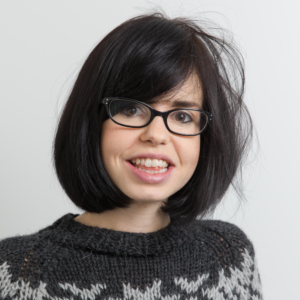 Dr Jess Wade is a post doctoral researcher in the Department of Physics and Centre for Plastic Electronics at Imperial College London focused on light emitting didoes. She is also a member of the Women in Science and Engineering (WISE) Young Women’s Board and is working with the young members board of the Women’s Engineering Society (WES) to design a PDF resource for schools outlining how awesome jobs in engineering are (the theme is ‘engineer a better world’).
Dr Jess Wade is a post doctoral researcher in the Department of Physics and Centre for Plastic Electronics at Imperial College London focused on light emitting didoes. She is also a member of the Women in Science and Engineering (WISE) Young Women’s Board and is working with the young members board of the Women’s Engineering Society (WES) to design a PDF resource for schools outlining how awesome jobs in engineering are (the theme is ‘engineer a better world’).
Jess has also worked with the Institute of Physics on their Improving Gender Balance project, and with a new EU-collaboration led by the Association of Science Centres called ‘Hypatia’ looking at gender balance in educational initiatives across the EU. She is involved with the Further Maths Support Network and the Stimulating Physics Network CPD, both of which focus on helping teachers, and the Turinglab, which offers free coding classes to girls in years 7 to 10. She has done fundraising for the Institute for Research in Schools, whose Amazing Atmosphere project, funded by the UK Space Agency, launched recently at the Eden Project.
Jess is planning a series of wikithons across the country for summer 2017, adding the stories of inspiring women in chemistry that have been lost to old journals and archives. If you’d like to take part, do get in touch with her.
You can read more about the work of the Imperial plastics electronics team on their website, and find out more about Jess at Making Physics Fun. And you can follow her on Twitter @jesswade.
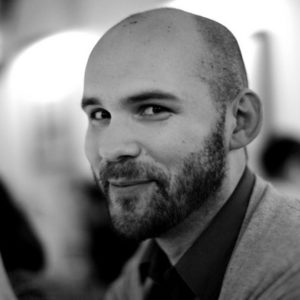 Robin Sloan
Robin Sloan
Robin Sloan is an American best-selling author whose first novel, Mr. Penumbra’s 24-Hour Bookstore, hit the New York Times Hardcover Fiction Best Seller list and the NPR Hardcover Fiction Bestseller List in 2012.
Between 2002 and 2012, Robin worked at Poynter, Current TV, and Twitter, and says that his job “had something to do with figuring out the future of media”. He is “interested in content (words, pictures, ideas) who also experiments with new formats, new tools, and new technology”.
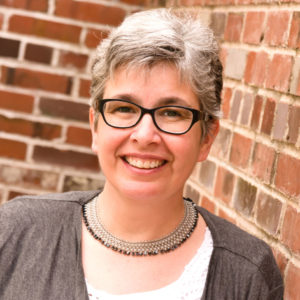 You can find out more about Robin on his website, and can follow him on Twitter @robinsloan.
You can find out more about Robin on his website, and can follow him on Twitter @robinsloan.
Robin was talking about science fiction author Ann Leckie, whose first novel, Ancillary Justice, won the Hugo, Nebula, and the Arthur C. Clarke Award. She then went on to write two sequels to Ancillary Justice: Ancillary Sword and Ancillary Mercy. You can follow her on Twitter @ann_leckie.
Discovery of the month
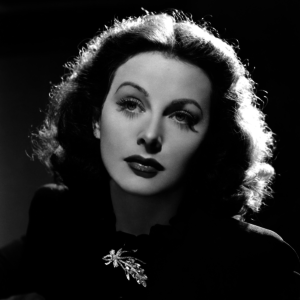 This month, we explore the invention of frequency hopping, a technique for protecting a radio signal by rapidly changing which frequency it is transmitted on, spreading the signal out over a wide band of the radio spectrum. Hollywood actress Hedy Lamarr and her collaborator avante-garde musician George Antheil were awarded a patent for their “Secret Communications System” in 1942, and it now underpins many communications technologies.
This month, we explore the invention of frequency hopping, a technique for protecting a radio signal by rapidly changing which frequency it is transmitted on, spreading the signal out over a wide band of the radio spectrum. Hollywood actress Hedy Lamarr and her collaborator avante-garde musician George Antheil were awarded a patent for their “Secret Communications System” in 1942, and it now underpins many communications technologies.
Competition winner
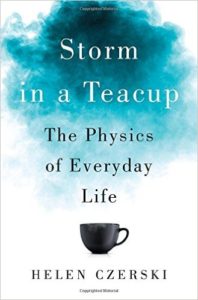 In March, we had a signed copy of Dr Helen Czerski’s Storm in a Teacup: The Physics of Everyday Life, to give away. In this, her newest book, Helen uses physics to answer some vexing questions, such as why does it take so long for ketchup to come out of a bottle? And, how do ducks keep their feet warm when they’re walking on ice?
In March, we had a signed copy of Dr Helen Czerski’s Storm in a Teacup: The Physics of Everyday Life, to give away. In this, her newest book, Helen uses physics to answer some vexing questions, such as why does it take so long for ketchup to come out of a bottle? And, how do ducks keep their feet warm when they’re walking on ice?
We are happy to announce that the very lucky winner is Kirsty Burridge! Congratulations Kirsty!
If you want to see Helen talking about her book and her work, then get yourself along to the Hay Festival on 27 May, Cheltenham Science Festival on 7 June, or the British Humanist Association Convention on 10 June. More details on Helen’s website!
Thanks to our sponsor
This podcast is brought to you thanks to the generous support of ARM, our exclusive semiconductor industry sponsor. You can learn more about ARM on their website at ARM.com and you can follow them on Twitter at @ARMHoldings.
Get in touch!
If you’d like to send us feedback about the show, or if you’d like to take part, please email us. We’re especially interested in hear from men who would like to talk to us about the women in STEM who have influenced them, especially those women who are less well known.
Credits
Episode edited by Andrew Marks.
